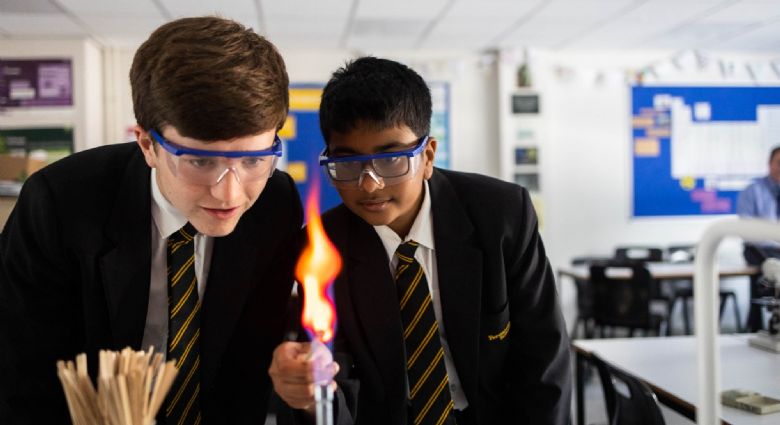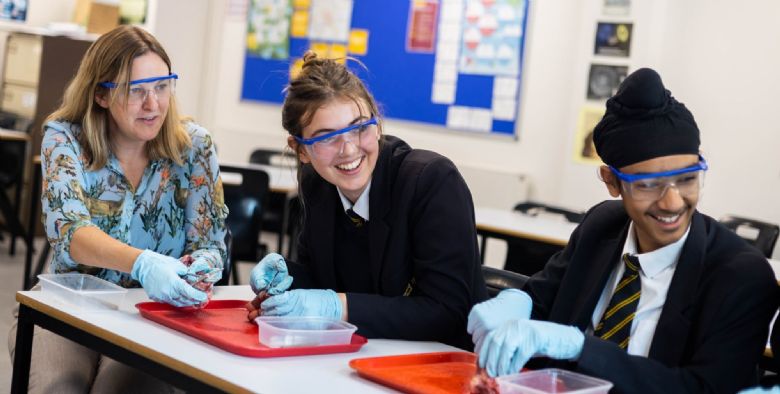Science
The Faculty of Science
In Science we seek to nurture, develop and enable students’ curiosity, to explore and develop their scientific knowledge and enquiry skills, discovering themselves, our world and the processes that take place within it, honing their powers of questioning, investigation and experimentation.
The Science Faculty is made up of specialist teachers, each bringing their own insight and experience into the classroom. At our core, we believe everyone is a scientist. The ability to understand the world around us, ask the right questions and weigh up evidence is central to being a successful citizen in the 21st century.

We support the exploration of science not just in the classroom but outside of curriculum time too. We encourage pupils to attend our weekly science club - offering the chance to get practical experience, hear from external visitors or take part in investigations outside the traditional lesson content.
We have a number of students each year who complete CREST Awards - recognised by the British Science Association. We also have students take part in the Physics Olympiad and Biology Challenge.
A Quality Curriculum
A high-quality education in science is essential to understand every aspect of our lives. Science is integral to understanding the living, physical and chemical world around us. Through excellent teaching, modelling, investigation, experimentation and enquiry, pupils will develop a sense of excitement and curiosity as they build up the vital knowledge and skills needed to become scientists of the future. Being a good scientist is about much more than just what takes place within the classroom. We encourage students to make links between the scientific principles they learn and their own lives. Bringing contemporary and relevant examples into lessons helps students to make these links.
The skills developed as scientists at Fernwood such as the ability to problem solve, critically analyse, consider evidence and the views of others are all key elements not just for scientific prospects but more broadly as a member of society. The Faculty of Science therefore recognises the importance of encouraging pupils to question evidence, consider bias and look at the context of ideas being proposed.
Latest news (Twitter & Instagram: @fernwoodscience)
Faculty tour
The Faculty of Science sits within specialist teaching rooms that allow for practical activities to take place across the full range of lessons and year groups. The laboratories are designed to allow pupils to immerse themselves both in the theoretical and practical side of Science. Practical with purpose is at the heart of what we do. Therefore, each laboratory comes with all the equipment and resources needed for pupils to learn in a ‘hands on’ way. There are 9 specialist teaching laboratories, 2 teaching rooms and 2 preparation rooms in the faculty.

FAQs
What do children learn during year 7?
In year 7, students study the key foundations of science. These include units of work about cells, reproduction, energy atoms and simple chemical reactions. These units are studied first as Year 8 and 9 then build on this knowledge to consider more complex ideas. Alongside this, pupils are also taught some of the key scientific skills including how to plan investigations, data analysis, drawing conclusions and evaluating experiments.
What other learning opportunities are there in Science?
Children are encouraged to do their own research alongside their studies in school. This could be through research online or even their own projects at home. Our students are encouraged to take an imaginative and creative approach to homework- which in the past has included making models and even baking cakes! There are opportunities throughout year 7 for pupils to complete tasks as a way of earning Fernwood Award points in lessons. There is a extra-curricular Science Club that runs once per week that pupils are welcome to attend. Science club allows pupils to do exciting investigations, creative tasks and build on ideas they have met in lessons.
What is practical work like in Science?
We are keen for pupils to experience as much practical learning in Science as possible. In the first few weeks of Year 7, we help train the students in the key safety aspects of working in the lab and also building their confidence in using some of the key equipment in practical work. We take the approach of trying to empower students to be able to investigate the big questions in science by collecting data or reflecting on evidence presented to them.
How does the Science department support students with different needs?
Our lessons are all taught by highly qualified specialist Science teachers who take a reflective and creative approach to their lessons. Students are engaged through a variety of different techniques and styles of lessons that help children to learn in different ways. Students are taught in mixed ability groups and are actively encouraged to learn Science from each other as well as from the teacher. Lessons often include group work, peer or self-assessment, creative tasks and many opportunities for independent learning. We provide more specialist support for students with additional needs or for those whose first language is not English.
